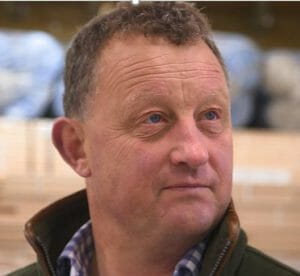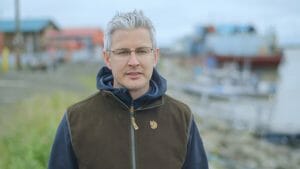Going Global with Ocean Health
NESI brings opportunity, shared values and international success to its alliance with Sealaska

Summers as a kid in a wild, remote corner of Scotland stirred Fred Stroyan’s spirit of adventure. It was his “mad passion for fishing,” though, that eventually inspired him to combine his love of world travel with leadership in the seafood business.
Fred was just 26 years old when he founded New England Seafood International Limited (NESI) in 1991. After three years working for a company that exported live lobsters around the world from Nova Scotia – and then a few more with a seafood company back home in the United Kingdom – Fred decided to start his own company to import live lobsters for London’s finest restaurants.
“I just wanted to do it myself,” he said. “I was young enough and foolhardy enough to start something.”
He and longtime friend Andrew Crawford partnered, and they initially handled everything themselves: Driving trucks to pick up lobsters and make deliveries from 2 am to 8 pm, administering the business, designing spaces for storage and processing.
Nearly three decades later, NESI is a highly respected, $200 million-a-year global enterprise. And it is becoming part of Sealaska’s family of businesses.
The scale and international reach of this alliance will build on long-standing commitments to sustainable operations. Together, these companies form a business nearing $1 billion in sales that can create enduring value through relationships, science and innovation, expert manufacturing, deep consumer insights and highly capable and empowered teams.
The alliance provides a unique platform from which to influence change and impact the factors that matter most to the long-term health of the industry and Earth’s oceans.
“One of the biggest challenges facing humanity is how to feed, water, educate and house a growing population on a finite planet,” said Sealaska COO Terry Downes. “Enormous social, environmental and economic value is possible when strong, like-minded organizations join forces across the world to make a bigger difference. Solving our most pressing problems requires working together with a global mindset.”
Bringing the world’s best seafood to the UK
That global mindset fueled NESI’s growth under Fred’s leadership.
NESI soon saw the need to diversify its lobster business. Fred built relationships with tuna suppliers in Sri Lanka and began bringing unusual species to the UK from all over the world. The company now imports seafood from 37 countries, supplies top retailers as well as restaurants, and has a reputation for operational excellence, social responsibility and sustainability.
“Nobody else was doing the exotic stuff,” he said. “And if we were going to do it, we were going to do the very best we could. When you’ve got the passion to find the best-quality fish, it’s very exciting. To me it’s not like a job. I’ve been very lucky that it’s taken me to incredible places.”
Those places include the Maldives, Australia, Korea – and Alaska. Fred developed a particular passion for building healthy, mutually beneficial relationships with indigenous populations and others who bring generations of tradition to their work in seafood. That made it a logical step to partner with Sealaska’s Alaska Native shareholders, whose people have been sustainably harvesting the sea’s bounty for 10,000 years.

“When we first went to Alaska, ninety percent of the fish were being headed and gutted and sold to Japan, or put in a can,” Fred said. “Many of the jobs processing fresh fish were in Anchorage. We pushed for fileting and vacuum packing as close to the point of catch as possible, whether in Bristol Bay or up on the Yukon. This improves quality, delivers improved returns and creates local jobs.”
This focus on building strong communities, honoring Native culture and stewarding our oceans for future generations is among the many values and approaches Sealaska and NESI share. Sealaska’s Orca Bay and NESI are both among the 11 founding members of the Global Dialogue on Seafood Traceability (GDST), and both are committed to further enhancing the sustainable and ethical credentials of their supply chains. The Marine Stewardship Council (MSC) has twice awarded NESI Retail Supplier of the Year in the UK, in 2018 and again in 2020. This prestigious award starts with retailer nominations for leaders in sustainability.
This is a particular point of pride for Fred, who noted that NESI has worked very hard with the MSC and others to turn things around for fisheries in trouble.
“Our work in looking after the oceans and being responsible – that’s part of our DNA,” he said. “We were the first in the UK industry to hire someone full-time on the sustainability side. The fact that Sealaska is also focused on ocean health and ocean sciences is a big draw, and very exciting.”
NESI CEO Dan Aherne, who has been with the company since 2003, underscored the extraordinary fit between the two organizations.
“Whilst Southeast Alaska and London could not be farther apart in geography and way of life, Sealaska and NESI are natural partners connected at the source, via product categories and by values and approach,” Dan said. “Both businesses share a clear vision around inspiring consumers to enjoy more seafood. Both take a long-term, global view to enhancing lives and promoting a thriving planet.”
Enhancing lives while promoting ocean health
Inspiring more seafood consumption is one way to combat the effects of climate change. Fisheries are among the most energy- and water-efficient sources of protein on the planet, according to the University of Washington. Seafood is also among the most nutritious of proteins. But seafood purveyors need to touch people’s hearts to persuade them to eat more seafood, Dan said.
“The category has been good at addressing the rational elements, such as that seafood is good for you” he said. “Unless people have that emotional connection, though, change won’t happen.”
Wild Alaskan salmon help make that connection with their own fascinating story. NESI has become widely respected for telling it well, especially with its own brands. Leap, which uses the tagline “free, not farmed,” is one of those.
“Wild salmon undertake one of the most amazing journeys of any wild fish, swimming thousands of miles through the cold, crystal-clear waters of the North Pacific and eating a rich, natural diet of shellfish and marine organisms,” said Max Ropner, NESI’s Wild Salmon Buying and Species Manager. “It’s this incredible journey that gives them their amazing properties. They have this intense red colour. They’re lean, packed with flavour, high in protein and vitamins, and low in fat.”
Wild, Alaskan salmon animate the Leap identity. And NESI has proven that building a brand identity can inspire more people to eat seafood. As premium brands have done for chocolate and wine, so they can for sockeye and albacore.

“We try and put products out there that will spark the imagination of consumers and create new value,” Dan said. “Fish is a complex category and, with household penetration of most species below 10 percent, there is no doubt that brands can play an important role in recruiting shoppers and driving consumption. It’s a long journey that needs a consistent approach and sustained investment.”
Together, Sealaska and NESI can make a significant difference. The alliance will open more channels and build more demand for Alaskan seafood in the UK, and will give Sealaska a chance to put some of NESI’s innovative thinking to work in the United States.
Fred shared enthusiasm about the opportunities this relationship creates.
“The synergies are huge,” he said. “We’re very like-minded people. It’s extraordinary. For us to be able to become part of a group where the long-term perspective and values are so similar feels very good.”
Employees of both companies will benefit from opportunities to learn and collaborate, he said.
“It’s the start of a new journey,” Fred said. “There’s so much opportunity both to build on our UK platform and to create a truly global seafood business. It will be a lot of fun doing it, as well.
“I feel a similar sense of excitement as when I started NESI in 1991. It’s going to be another great adventure for me and all the team.”
To learn more about NESI, see the NESI fact sheet.